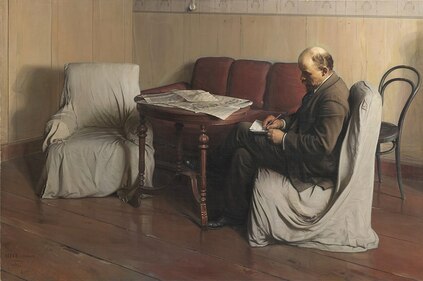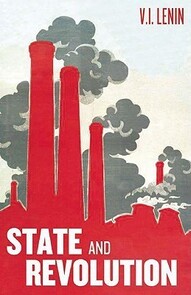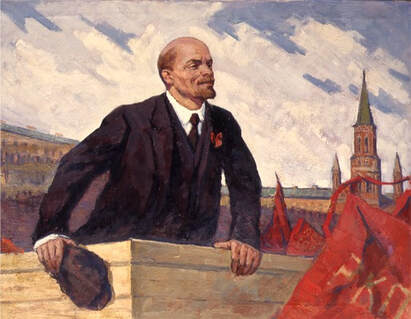|
6/30/2021 V. I. Lenin: State and Revolution — Commentary and Analysis. (2/12) By: Thomas RigginsRead NowChapter One "Class Society and the State".Lenin begins by remarking that the great leaders of oppressed humanity are reviled and hated by the rulers of the day but after their deaths attempts are made "to convert them into harmless icons." Martin Luther King was reviled in his day as a trouble maker because of his civil rights work and as a traitor because of his opposition to the Vietnam War. Now he has schools named after him and his birthday is a national holiday. His fiery rhetoric against racism and imperialism forgotten. Malcolm X has suffered a similar fate. Once hated by the establishment and mass media he now has streets and housing projects named in his honor and his image graces postage stamps. His ideas virtually forgotten. We have also seen the arch "terrorist" and communist agent Nelson Mandela rechristened as the grandfatherly "Madiba" an advocate of nonviolence-- his call for the oppressed to arm themselves and fight for their liberation lost among the platitudes of the world figures who rushed to his funeral to heap praises on the man they tried for so many years to undermine and destroy. Just so was the fate of Karl Marx according to Lenin. Many left wing politicians and labor leaders of Lenin's day praised Marxism and even called themselves Marxist-- along with university professors and public intellectuals (then as now their name is Legion)-- but their real purpose was "to omit, obscure or distort the revolutionary side of this theory, its revolutionary soul." Lenin wants to reverse this trend-- which is even more prevalent today than in Lenin's time-- at least on the socialist left and among those he called "petty bourgeois intellectuals." He sees the main purpose of his book "is to RE-ESTABLISH what Marx really taught on the subject of the state." My purpose is to establish what Lenin actually thought Marx's teaching was-- not decide on its correctness or the truth or falsity of the teaching --at least we will be able to tell the difference between those who only give lip service to Marxism and those who take it more seriously. Lenin's procedure is to look up the passages that Marx and Engels devoted to the state and to clearly present them so that, he thinks, no one can be confused about what their ideas really were. He starts off with passages from "the most popular of Engels's works"-- namely The Origin of the Family, Private Property, and the State. Popular as this book may be, I don't think it is today Engels's most popular work-- I doubt if, outside of the socialist left, any of Engels's works are considered "popular." In any event, in this work Engels tells us that the state appears at a particular time in the history of social development. It is not present in bands of hunter gatherers, or in clan or tribal societies but arises when social development has led to specialization of functions in city states where there are food producing peasants, and a ruling upper strata has evolved with professional armed "peacekeepers" at their disposal. What has appeared are "classes" of people with different economic functions who find their interests are not always harmonious and they are often in conflict with each other. These developments began during the late new stone age (the Neolithic Revolution) as a result of the creation of agriculture which allowed for the production of a surplus food supply which called for management and storage. In order for the society in question to maintain social peace and not tear itself apart a power needed to be created that could enforce "order" or social peace and, Engels says, "this power, arisen out of society but placing itself above it, and alienating itself more and more from it, is the state." But why was it that social peace was disrupted by the creation of an agricultural surplus? Because the management and distribution of the surplus was delegated to a group of individuals who were relieved from the daily work of actual production. In times of scarcity conflicts arose between the actual producers and those responsible for distribution of the surplus. These two groups each had one important goal in mind-- group survival-- and thus ultimately found themselves at loggerheads over the distribution of the social surplus. This resulted in an irreconcilable contradiction between the classes and is the basis for the proposition enunciated in the Communist Manifesto that history, as we know it, is a history of class conflicts. "The state," Lenin writes, " is a product and a manifestation of the iRRECONCILABILITY of class antagonisms. The state arises where and insofar as class antagonisms objectively CANNOT be reconciled." According to Lenin this fundamental Marxist principle means that where we have state power-- that is wherever we find societies based on classes -- we will find that the education system, the mass media, and the political system in general is dedicated to the view that "the state is an organ for the RECONCILIATION of classes." The class in power knows better but, at least in modern times, its pundits, press, and propagandists preach this doctrine incessantly. "According to Marx," however, "the state is an organ of class RULE an organ for the oppression of one class by another." No harmonious society here. If you have ever wondered why the government can't (or won't) control the banks and big corporations, why it doesn't end fracking, why it won't act on climate change or really protect the environment, why food companies and restaurant chains can sell us junk to eat, why women, workers, immigrants, minorities and the poor always get the short end of the stick, the cops always bust up the strikers and protestors demonstrating for their rights, why the interests of the 99% can't democratically get anywhere with respect to the interests of the 1% and whistleblowers go to jail and hypocrites to the state house all you need remember is that it's the 1%'s state not the 99%'s. "That the state," says Lenin, "is an organ of the rule of a definite class which cannot be reconciled with its antipode (the class opposite to it) is something the petty-bourgeois democrats will never be able to understand." If Lenin is correct this could have long term implications for left-center unity. The left could make tactical alliances with the center on definite issues but how could the left make long term strategical alliances with people who will never be able to understand what's really going on? This is a question we will hopefully get back to later. Lenin ends this section by referring to Kautsky's views which are relevant here. There are some who, like Kautsky, agree in theory with what Lenin has explained is Marx's theory of the state but they distort it and do not draw the proper conclusions in practice which are, according to Lenin, "that the liberation of the oppressed class is impossible not only without a violent revolution, BUT ALSO WITHOUT THE DESTRUCTION of the apparatus of state power which was created by the ruling class and which is the embodiment" of the "alienation" of the state from the society it dominates. Well this is indeed a radical conclusion which cannot be drawn from the evidence Lenin has so far put forth from the quotes he has produced from Marx and Engels. Lenin is aware that he has jumped the gun here and tells us that he will demonstrate the truth of the above conclusions later in his work. We shall see. One of the laws of dialectics is the unity and reconciliation of opposites so it will be interesting to see why this does not apply to the organ of one class and its "antipode." Next Up: Sections 2 and 3 of Chapter 1 of State and Revolution AuthorThomas Riggins is a retired philosophy teacher (NYU, The New School of Social Research, among others) who received a PhD from the CUNY Graduate Center (1983). He has been active in the civil rights and peace movements since the 1960s when he was chairman of the Young People's Socialist League at Florida State University and also worked for CORE in voter registration in north Florida (Leon County). He has written for many online publications such as People's World and Political Affairs where he was an associate editor. He also served on the board of the Bertrand Russell Society and was president of the Corliss Lamont chapter in New York City of the American Humanist Association.
0 Comments
Leave a Reply. |



 RSS Feed
RSS Feed